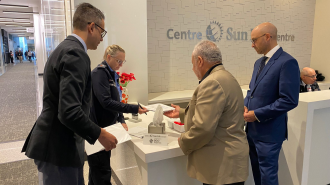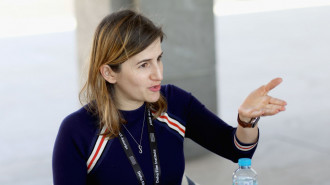
How Egypt’s abortion ban is pushing women towards dangerous black market practices

Laila* tossed and turned, unable to sit, lie down, or stand. The pills she had been taking for the past few hours started to induce violent contractions that nearly suffocated her. The sight of blood on her thighs made her nauseous.
The 29-year-old discovered that she was pregnant a month earlier, and because she felt unready to raise a child, she chose to terminate the pregnancy.
Her resolve, broke, however, as the physical pain tore through her that night. She would do anything for it to stop.
Under Egyptian law, Laila is a criminal, as articles 260 to 264 of the penal code criminalise abortion.
Women who knowingly take abortive medications, including survivors of rape and incest, face severe legal repercussions.
Medical professionals, such as doctors, surgeons, pharmacists, or midwives, who perform abortions, or any individual who administers medications or guides a pregnant woman through an abortion, with or without her consent, are also subjected to imprisonment.
However, research reveals that legislative laws that aim to restrict abortions, may not reduce the number of procedures but could significantly increase the risk and danger involved.
“Data on abortions in Egypt is scarce, however, global research shows that banning abortion doesn't stop the practice but leads to unsafe and illegal abortions — a necessity for various reasons — and leads to an expanding black market,” Lobna Darwish, the director of the Egyptian Initiative for Personal Rights (EIPR) women's rights and gender program told The New Arab.
Abortions occur at similar rates in the least regulated countries and the most regulated countries that ban abortions, with 34 abortions annually per 1,000 women aged from 15 to 44 in the former, compared to 37 abortions in the latter.
The risk of death from untreated complications during an abortion is significantly higher in heavily restricted countries compared to countries with lenient laws — as less than one percent of abortions are considered unsafe in the least restrictive countries, compared to 31 percent in the most restrictive countries.
This stark disparity accounts for eight to 11 percent of all maternal deaths associated with abortion, resulting in the loss of between 22,800 and 31,000 lives each year.
An ever-expanding black market
“Many women who can not find support from healthcare providers obtain abortion pills illegally from the black market and take them,” Lamia Shehab, an obstetrician and gynaecologist (OB-GYN) in the Egyptian Fellowship for Obstetrics and Gynaecology, told The New Arab.
In November 2022, Laila, frightened and seeking help, contacted an OB-GYN who was an acquaintance.
“The doctor told me to buy abortion medication, and he would guide me,” Laila told The New Arab.
Her friend bought her Cytotec, an abortion medicine, for $16 from the black market, hid it inside another item, and packaged it well, then sent it to her house using a ride application.
“I felt like a criminal for doing something that I believe is my right,” she said. “It is my body and my life and all I needed was medical support.”
Cyctotic, currently unavailable in the official market and is listed as an illegal import, is prevalent in the black market, according to an Egyptian pharmacist working at a governmental organisation, who asked to remain anonymous.
In Egyptian hospitals, safe and legal abortion medications are present and are only prescribed in cases of miscarriage or if the mother’s life is in danger.
These include Misoprost, Misotac, and Vagiprost. As of July, a 20-tablet pack of Misoprost costs $0.54, a 20-tablet pack of Misotac costs $0.54 to $0.82, and a four-tablet pack of Vagiprost costs $0.25, the source added.
Undercover reporting by The New Arab revealed at least a dozen Facebook accounts, pages, or groups advertising abortion pills and ‘safe’ abortion surgeries.
Upon engaging with these pages, it was revealed that an “American imported” Cytotec 14-tablet blister pack was sold at varying prices.
One alleged doctor sold it for $32.8, a pharmacist charged $139.6, and another suspected doctor offered it for $205.3, and performed a dilation and curettage surgery for $308.
As for abortion surgeries, these are carried out in apartments or small villas in remote areas, and cost anywhere between $308 and $616.
Because of abortion’s inaccessibility, women face unequal medical attention, placing the lives of disadvantaged women at greater risk, according to Darwish.
“This leaves women vulnerable to blackmail and financial exploitation as they resort to illegal methods, often paying exorbitant prices beyond their means, without any protective rights,” she said.
'Making abortion illegal doesn’t stop it from happening'
“There are some pharmacists that dispense prescribed abortion pills without a valid prescription,” Shehab stated, adding that many of the pills sold are sometimes counterfeit.
Without medical oversight, home abortions are dangerous due to ineffective medications and incorrect doses, according to Shehab, who notes that the appropriate dosage depends on the patient’s medical history, including previous births, whether natural or via C-section, past abortions, and the developmental stage of the fetus.
“Incorrect use of abortion pills can lead to severe complications like uterine rupture, heavy bleeding requiring a hysterectomy, or ineffective pills that fail to terminate the pregnancy, potentially resulting in congenital anomalies in the newborn,” she continued.
“Abortion medication should not be administered outside a hospital, as patients are not fully informed of the risks or when to seek immediate help.”
Under the guidance of her doctor, Laila took 12 pills over 12 hours, bled heavily, and threw up regularly.
While Laila’s doctor recommended over-the-counter painkillers, such as ibuprofen, to manage the pain during the abortion, it didn’t dull the pain.
“I felt like I needed urgent medical care to manage the pain, and I couldn’t go to the hospital or seek help,” she said.
“Most of the people around me wouldn't understand or respect my choice, and that's why we need to raise awareness and build a supportive community for women.”
Supporting the need for awareness, Darwish stated that if abortions are legalised and treated as any other medical procedure at affordable prices, they would be accessible to women and safer with fewer risks and better results.
“History shows that making abortion illegal doesn’t stop it from happening, and black markets are probably here to stay,” she said.
*Name changed upon request
This author from Egypt is writing under a pseudonym to protect their identity






 Follow the Middle East's top stories in English at The New Arab on Google News
Follow the Middle East's top stories in English at The New Arab on Google News


